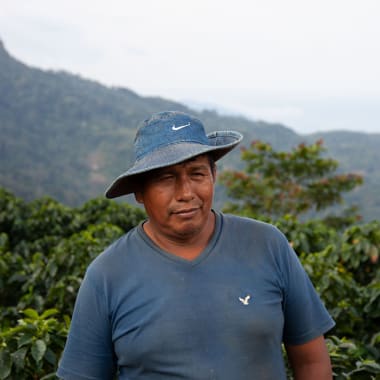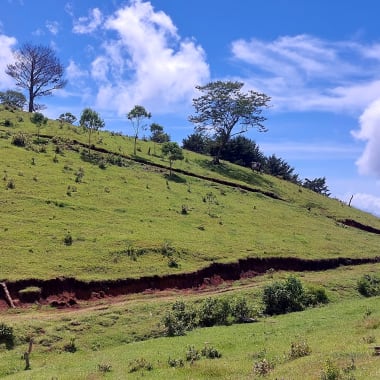-
Producer
-
Julio Paye Mamani And Lupe Medina
-
Country
- Bolivia
-
Region
-
Copacabana, Caranavi
-
Altitude
-
1500m above sea level
-
Varieties
-
Process
-
Importer
-
Melbourne Coffee Merchants
-
Body
-
Full
-
Acidity
-
Medium
-
Tasting notes
-
Christmas cake, dried fig, raisin
-
Roast style

Bolivia
Julio Paye Mamani
Finca San BartoloméThis coffee was produced by Julio Paye Mamani and Lupe Medina from Copacabana, a small and remote settlement located 180km from La Paz, in the heart of the Caranavi province.
The region’s with incredibly high altitudes, rich soil, and wide daily temperature ranges are the perfect conditions for growing high quality coffee, and the region is the heart of specialty coffee production in Bolivia.
Coffee was first farmed in Copacabana around 40 years ago, and farms in the region are still small and traditional. Almost all work is carried out by farm owners and their extended families, with a handful of temporary workers taken on to help out during harvest.
All of the producers at Copacabana were born into the Aymara, an ancient indigenous group that lived on the Altiplano (a vast plateau of the central Andes that stretches from southern Peru to Bolivia and into northern Chile and Argentina). The region was known for the world’s highest lake, called Titicaca, and when their families moved to Caranavi, they named their ‘colony’, or settlement, Copacabana.
Julio and Lupe have a three-hectare farm called San Bartolomé, named after Julio’s father. Julio has lived in the region since he was a child, later inheriting the farm.
For many years Julio and Lupe (like many families in Copacabana) sold their coffee on the local market, meaning low prices and little reliability. Over the last decade, they’ve shifted to focus on specialty coffee and have been able to sell their coffees for substantially higher prices to our partners at Agricafe, which processes specialty lots at their Buena Vista washing station which is located in Caranavi.
 The coffee nursery at Finca San Bartolomé
The coffee nursery at Finca San Bartolomé
About Agricafe
Agricafe is a Bolivian family business owned by Pedro Rodriguez and his daughter Daniela and son Pedro Pablo. The trio’s mission is to build the production of, and market for, Bolivian specialty coffee. To do this, they have invested efforts and funding across the entire specialty coffee production chain, including buying coffee from hundreds of local farmers, establishing state-of-the-art wet and dry mills, launching producer training programs, and planting new coffee farms across the regions of Caranavi and Samaipata.
Over the last decade, Agricafe has been working to try and save the Bolivian coffee industry. Despite its international recognition and highly sought after coffees, production of coffee across Bolivia has decreased dramatically and has been at risk of completely disappearing. A combination of ageing coffee plantations, traditional and very unsophisticated farming techniques and diseases such as leaf rust have resulted in significantly reduced yields, and this, combined with the proliferation of the competing coca industry (used for cocaine), has seen coffee production more than halve.
To try to save coffee production in Bolivia and build a more sustainable future for it, the Rodriguez family started a project called Sol de la Mañana (which translates to ‘morning sun’).
 Besides coffee, Julio and Lupe grow oranges, tangerines and lemons on San Bartolomé.
Besides coffee, Julio and Lupe grow oranges, tangerines and lemons on San Bartolomé.
Sol De La Mañana
The first of its kind in the country, the Sol de la Mañana program is aimed at sharing knowledge and technical assistance with local producers to help them renovate their farms and improve their productivity. By doing so Agricafe hopes that coffee production can be a sustainable and financially stable crop for the smallholder farmers like Julio and Lupe, for many years to come.
Julio and Lupe joined the Sol de la Manaña program in 2016. As members of the program, they have followed a very structured series of courses, focused on improving their quality and yield. The curriculum focuses on one aspect of farming at a time and covers things such as how to build a nursery, how and when to use fertiliser, how to prune, has how to selectively pick coffee.
The results of this program have been profound, with improved quality and quantities for all participating producers, including Julio and Lupe. “Sol de la Mañana has opened my eyes. I genuinely enjoy making an effort and learning because it’s been an opportunity to change my life.” Julio explained.
Since joining the Sol de la Mañana program, Julio and Lupe have drastically renovated their plantation, and now have 3 hectares of very healthy trees, that is neatly organised in well-spaced and neat rows.
At the base of the farm they also have a vibrant nursery, and three years on from joining the program, the family are starting to gain exceptional yields from this investment of the farm of more than 30 bags per hectare (prior to 2016, the farm yielded less than 6 bags/hectare).
 The view from Finca San Bartolomé
The view from Finca San Bartolomé
Perhaps most critically – the family’s involvement in Sol de la Mañana has made Julio fall in love with coffee. Previously, coffee was simply a cash crop for him, but not a passion. He split his time between a small shop in town selling soft drinks and the farm.
“Now all I want to do is be here”. Julio explained. “I have found my passion”.
These days Julio spends most of his days on the farm and gets help from his son Dario, who is still in school, in the afternoons. Lupe manages their soft drink shop each day, and Julio takes over in the evening. Their days are long, and very busy, but as their coffee farm grows, the family hopes to be able to focus all of their time on the farm.
“Now that I have more financial security, I want to help the community of workers who help me pick the coffee. I want to help them improve their lives and pay them more.” He explained. Julio has also built a small house for their family on the farm and hopes to one day move from Caranavi to live there. “I want to call San Bartolomé my home”
Already the farm feels like home. Lupe has lined the coffee plantation with beautiful flowers, and the family have also planted oranges, lemons and tangerines on the farm, that they sell at the local market.
Learn everything about this coffee:
Ethical, traceable sourcing
This page has all the sourcing information (variety, process, region, story, importer, and more) that our importers share with us, and give us permission to use.
The transparency helps us talk confidently about the quality and background of our product, and it helps you know exactly what you’re buying.
Learn more:
Coffee page transparency legend
Our coffee philosophy
Our business approach
Fresh harvest coffee
We only source and roast coffee from each country’s latest harvest season (so the green coffee is never older than 1 year from the time of picking, processing and packing). This ensures the sensory qualities are always at their peak and unaffected by excessive ageing.
Roasted for espresso and filter (best enjoyed black)
Roast style: omni. Omni roasts are designed to brew and taste great both as espresso and filter. Our omni single origins generally sit on Agtron values in the ~70-60 value range. So, technically, they are somewhere in the lighter side of the medium spectrum.
Designed for espresso and filter brewing. Best enjoyed black.
Learn more:
Our Loring Kestrel S35 roaster
Our roasting style and approach
Best brewed within days 15-49 post-roast
The ‘fresh is best’ saying doesn’t apply to coffee (contrary to popular belief). Waiting before opening and brewing your bag of whole coffee beans helps develop peak flavour and acidity.
But heads up: if you buy pre-ground coffee, brew it as soon as possible.
Learn more:
Our recommended brewing window
Try our custom brewing recipes
Our recipes and ratios are tailored to our coffee sourcing and roasting styles, bringing the best flavour and feel out of each coffee.
For pour over, immersion, and other filter brewing styles, check our brew guides.
For our espresso single origins, we recommend a coffee:yield ratio of 1:3:
- Dose: 20g ground coffee
- Yield: 60g espresso
- Total brew time: ~24-28 seconds
This is just a starting point! We encourage you to experiment, taste, and adjust to find the recipe that you enjoy the most.
Learn more:
Our espresso brew guide (single origin)
Brewing ratio calculator
Packaging and sustainability
- Bags: ABA-certified home compostable (AS 5810-2010)
- Labels: recyclable
- Valves (only on +250g bags): general waste
- Box and tape (online orders): recyclable
Learn more:
Our packaging
Varieties
Catuai variety
Created by the Instituto Agronomico do Campinas in Brasil, Catuai is a hybrid varietal between Caturra and Mundo Novo.
Caturra variety
Caturra is a natural mutation of Bourbon that was originally discovered in Brazil in 1937, considered to be the first naturally occurring mutation ever discovered.
The location
Coffee from Bolivia
Historically, Bolivia has not been as popular as its neighbouring countries in terms of exports, but coffee has been present since the 19th century.
Farm processes
Washed process
Machines are used to remove the flesh from the coffee cherry before being fermented in water, washed again, and finally sun dried. This process tends to result in more distinct, cleaner flavours.

Subscribe to a world of coffee
Discover a new single origin coffee from Sample every 1-5 weeks with no delivery fees.
No up-front purchase, and you can pause, cancel, or change plans at any time.
Available to order online this week:

Ethiopia Tadese Teko
Flavours of bergamot, mandarin, mango
Body Acidity
Washed Ethiopian Heirloom
January 2025 harvest
Roasted omni for filter and espresso
Ethiopia Tadese Teko online
Kenya Karimikui
Flavours of blood orange, blackberry, plum jam
Body Acidity
Washed Batian, SL28, SL34, Ruiru 11
November 2024 harvest
Roasted omni for filter and espresso
Kenya Karimikui online
El Salvador Manuel Castañeda
Flavours of toffee apple, cranberry, dulce de leche
Body Acidity
Honey Pacamara
March 2025 harvest
Roasted omni for filter and espresso
El Salvador Manuel Castañeda online
Colombia Rigoberto Chavarro
Flavours of brown sugar, wine gum, candied stone fruit
Body Acidity
Washed Pink Bourbon
February 2025 harvest
Roasted omni for filter and espresso
Colombia Rigoberto Chavarro online